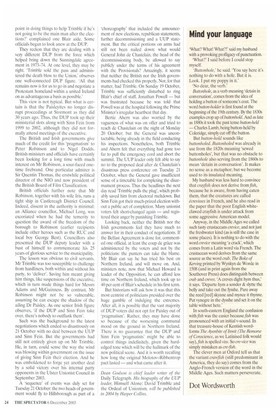Mind your language
'What? What! What?!' said my husband with a provoking profligacy of punctuation.
'What?' I said before I could stop myself.
'Buttonhole,' he said. 'You say here it's nothing to do with a hole. But it is. Look, I put my poppy in it.'
'No dear, the verb.'
Buttonhole, as a verb meaning 'detain in conversation', comes from the idea of holding a button of someone's coat. The word button-holder is first found at the beginning of the 19th century. By the 1830s examples crop up of buttonhoid. And as late as 1880s it took the past tense button-held — Charles Lamb, being button-held by Coleridge, simply cut off the button.
But button-hold sounds like buttonholed. Buttonholed was already in use from the 1820s meaning 'sewed buttonholes', but that was no obstacle to buttonhole also serving from the 1860s to mean 'detain in conversation'. It makes no sense as a metaphor; but we become used to its insulated meaning.
My husband was less hard to convince that crayfish does not derive from fish, because he is aware, from having eaten them, that the creatures are called ecrevisses in French, and he also read in the paper that the poor English whiteclawed crayfish is under attack from some aggressive American model.
Anyway, in the Middle Ages we called such tasty crustaceans crevice, and not just the freshwater kind (as is still the case in some places). It is nothing to do with the word crevice meaning 'a crack', which comes from a Latin word via French. The crustacean word derives from the same source as the word crab. The Boke of Kerving printed by Wynkyn de Worde in 1508 (and in print again from the Southover Press) does distinguish between crab and creves. 'A creves dight hym thus,' it says. Departe hym a sonder & slytte the belly and take out the fysshe. Pare away the reed [red] skynne and mynce it thynne. Put vynegre in the dysshe and set it on the table without hete.'
In south-eastern England the confusion with fish was the easier becausefish was pronounced with an initial v-sound. In that treasure-house of Kentish wordforms The Ayenbite of Inwit (The Remorse of Conscience, as we Latinised folk would say),fish is spelled viss. So cre-vice was simply mistaken as cre-fish.
The clever men at Oxford tell us that the variant crawfish (still predominant in America, they do say) comes from the Anglo-French version of the word in the Middle Ages. Such matters perseverate.
Dot Wordsworth


























































































 Previous page
Previous page